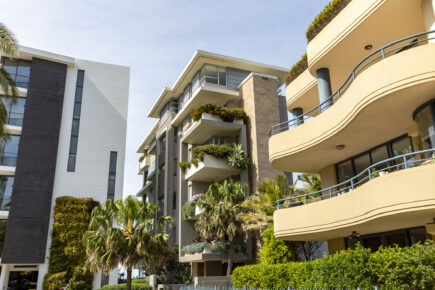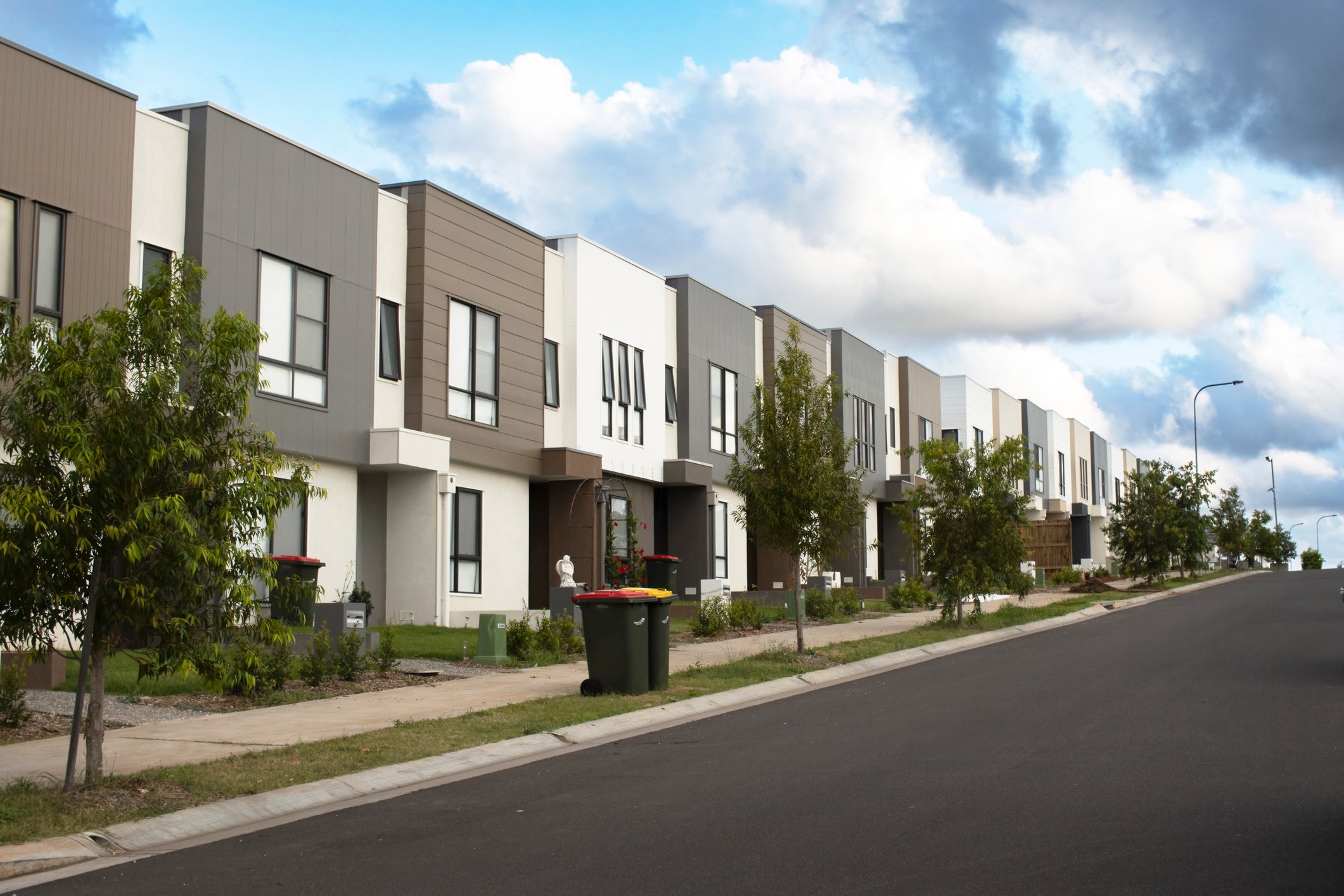A townhouse is a multi-level, self-contained dwelling often designed to mimic a house. Unlike houses, though, townhouses are on a strata title, which means the homeowner owns the property but shares the land and common areas with other townhouse owners.
Townhouses account for 13% of private dwellings in Australia, with nearly half occupied by renters.[1]
How much do townhouses cost?
According to the most recently available sales data, prices for townhouses can vary widely nationwide. However, they’re generally cheaper than houses.
At the time of writing:
- Two sales in the Brisbane suburb of Nundah in 2024 saw a three-bedroom townhouse fetch $750,000 while a three-bedroom house in the same neighbourhood sold for $980,000.
- Similarly, in the inner city Sydney suburb of Burwood, a three-bedroom townhouse recently fetched $1,610,000, while the median price for a three-bedroom house in the same suburb in 2023 was $2,075,000, according to the REA group.
- In Melbourne, recent sales data from the suburb of Box Hill showed that a three-bedroom townhouse sold for $990,000, while the median sale price for three-bedroom houses was $1,517,000.
These examples do not represent the entirety of the Australian property market, but they do illustrate the gap that often exists between townhouses and houses. A range of factors, such as the size of the property and a higher supply of townhouses in inner-city suburbs, can influence this gap.
Townhouses may also be cheaper because they typically cost less to build. Data from the ABS shows the average cost to build a new house in Australia was $320,200 in 2018-19, while townhouses cost only $280,000.[2]
How do townhouses compare to other types of dwellings?
When comparing property types, your decision to buy or rent depends on your circumstances. Townhouses and apartments may require less maintenance and responsibility as shared spaces are managed by a body corporate. However, they may also offer less privacy than a terrace or semi-detached house.
» MORE: Townhouse vs house vs apartment
Townhouse vs house
Townhouses are usually smaller than freestanding houses.
According to the Australian Bureau of Statistics, the average floor plan of new townhouses is 156.9 square metres, while that of new houses is 229.8 square metres.[2]
Ownership: Houses are usually on a freehold property title rather than a strata title, which gives the owner more freedom to renovate and means no body corporate fees.
Space: The size and cost of a townhouse are typically lower than those of a freestanding house. Additionally, freestanding houses do not share space with neighbours.
Townhouse vs apartment
Ownership: Apartments also typically fall under a strata title, with communal spaces managed by a body corporate.
Space: One key difference is that townhouses may have more private spaces like gardens, yards or decks. Furthermore, apartments may be in large buildings with tens or even hundreds of others. Townhouses will generally be multi-level with a ground floor and only a few shared walls/areas in the complex.
Townhouse vs terrace
Ownership: Terrace houses are usually owned on a freehold property title. Like freestanding houses, this means no body corporate or strata fees.
Space: Terrace properties usually consist of a row of houses, each sharing walls with the adjacent neighbour. They often have private yards/gardens that are not shared with neighbours.
Townhouse vs semi-detached
Ownership: Semi-detached houses share a common wall but are usually individually owned with a freehold property title.
Space: A semi-detached house usually consists of two separate houses joined by a common wall. Each housing unit has a private entrance and spaces like yards and decks.
Pros and cons of buying a townhouse
Pros
- Affordability. Townhouses are generally more affordable than houses, making them more attractive to first home buyers.
- Security. Many townhouses are part of a complex or gated community, meaning better security than a freestanding house.
- Low maintenance. Unlike a house with a backyard, the body corporate maintains the the shared facilities. Townhouses with their backyard are usually smaller and easier to maintain than a large block of land.
- Community. Because they are close to others, townhouses can offer a greater sense of community with neighbours.
- Space. Townhouses can provide more space and privacy than apartments.
Cons
- Fees. Homeowners usually purchase townhouses under a strata title, which means paying body corporate and strata fees for the management and upkeep of shared facilities. The cost of these fees will be the same regardless of how much you use these community perks.
- Lack of privacy. Townhouses typically offer more privacy than apartments; however, they still fall short of most freestanding houses in terms of a sense of solitude. So, while communal areas such as pools and gardens can be great, you will share them with your neighbours. Similarly, townhouses may share walls with neighbours, which can be noisy depending on the quality of the building.
- Restrictions. The body corporate may restrict how much you can alter your townhouse. Check the bylaws before buying, as they could limit even minor installations like solar panels.
- Capital gains. Townhouses are cheaper to build, so there is a risk of oversupply in your neighbourhood, which could lead to the value of your property remaining flat or even falling over time.
» MORE: When can you renovate an apartment?
Is buying a townhouse right for you?
Like any property purchase, you must carefully reflect on a few key elements. If you are considering a townhouse, keep these factors in mind.
Your budget
For first home buyers, a townhouse may be a cheaper and more accessible way to get a foot in the property door.
A townhouse may also offer facilities you couldn’t afford in a freestanding property, such as an outdoor barbecue area, pool or garden space.
🤓 Nerdy Tip
Before you decide to buy, take steps to build up your credit rating and get your finances in order so you can clearly see how much you can realistically afford to borrow. Sticking to the limit determined by your budget will help you avoid financial issues — including mortgage stress — down the track.
Your lifestyle and location preferences
Along with a potentially more reasonable price tag, you may be able to buy or rent a townhouse in a suburb where you can’t afford a freestanding house. For those looking for an inner-city home, a townhouse may offer more space than an apartment while keeping you in a desirable location.
You also need to consider if the townhouse fits your lifestyle. You may compromise on privacy compared to a house with shared walls and spaces. However, you might also discover a sense of community with so many close neighbours.
🤓 Nerdy Tip
Make sure you list your priorities regarding location, size of the property and what facilities it offers. You should also take into account the ongoing cost of strata fees.
Article Sources
-
Australian Bureau of Statistics, “Housing: Census,” accessed April 9, 2024.
-
Australian Bureau of Statistics, “Characteristics of new residential dwellings – A 15 year summary,” accessed April 9, 2024.
DIVE EVEN DEEPER

Lease Vs. Rent: What’s the Difference in Australia?
The terms lease and rent are often used interchangeably in Australia, but they actually mean different things when it comes to property.

What Is A Rental Bond?
Beyond weekly payments, one of the largest costs associated with renting is likely your rental bond.

What Is A Dual Key Apartment?
Property investors often use dual key apartments to receive double the rental income from one property.

Joint Tenancy vs. Tenancy In Common
Buying a house is always complicated, but getting the ownership agreement correct from the outset can help your future self avoid headaches and hassles.

